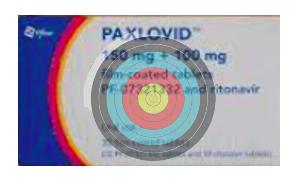An important drug from a giant drug company is bound to have a target on its back. Lately, this has been the case with Pfizer's Paxlovid. The drug, which is remarkably effective in preventing hospitalization and death in people with COVID, has scored the "Bad News Hat Trick" – seemingly three different failures. At least that's what you might gather just from the news. Let's take a closer look at the "failures":
- So-called "breakthrough infections" (which may or may not be a problem)
- Failure to act prophylactically to prevent COVID infection (This is actually good news. And it shouldn't work anyhow)
And recently:
- Failure to demonstrate efficacy in reducing symptoms in standard-risk people.
Let's look at this last one. Is this really bad news? Does it matter? Can it be explained?
First, here is a summary of the data for #3:
In a trial of standard-risk patients – those least likely to actually need the drug – people (either vaccinated or unvaccinated) who took the drug seemed to feel better (self-reported) for four days in a row, but the results were not statistically significant.
In other words, the data were not robust enough to determine with reasonable certainty that the drug truly made people feel better rather than the results being due to chance. So, one cannot conclude from the trial that the drug did or didn't work. "Seemed to" is not good enough; the burden of evidence was on Pfizer, so in the absence of stronger data, the company could not claim any benefit of the drug.
There are (at least) two plausible reasons for these findings: 1) the drug was ineffective, or 2) the trial was not sufficiently powered (not enough participants) to demonstrate efficacy. My guess is #2. Here's why.
Paxlovid has been proven to be a very effective antiviral drug (1) in preventing serious illness and death. It reduces viral load, which, in turn, lessens symptoms. Of course, the drug also reduces the viral load in standard-risk patients, but serious illness in people without known risk factors is rare. So, it is quite possible that too few people became sick enough to report their symptoms, resulting in an insufficient dataset from which to draw conclusions. Pfizer's December 2021 press release indicates this:
"Data from standard-risk patients, both vaccinated and unvaccinated, while not all statistically significant, are supportive of efficacy data observed in [the] study."
Since it takes more participants to demonstrate efficacy when the difference between treated and placebo is small, it is quite possible, perhaps even likely, that in a larger trial, the data would be more robust and a real effect seen. But we'll never know. Pfizer will not extend this trial.
The secondary endpoint was the number of COVID-related medical visits.
Using this measure, drug-treated patients were 62% less likely to seek medical help than those who received a placebo but once again, the data weren't strong enough to draw statistically-significant conclusions. Although a 62% decrease seems like a lot, Pfizer describes this figure as "nominally significant" – a hint of utility but insufficient evidence to back it up. Again, Pfizer cannot claim that Paxlovid reduces medical visits, even though it may do so.
Bottom Line
Pfizer was shooting for the stars with this trial. Because the drug works so well in preventing hospitalization and deaths, it was not unreasonable that it would make healthy people with milder infections feel better. This may well be true, but the company has insufficient proof to get Paxlovid indicated for this purpose.
Where does this leave us?
Different doctors have been using the drug very differently. Some will call in the prescription as soon as a patient has symptoms and a positive test. Others prescribe it only when they feel it is necessary for a given patient. But this isn't necessarily an easy call. After five days of illness, Paxlovid is no longer effective. Since there is no way to accurately predict who will become seriously ill, there will certainly be people at low risk who will nonetheless become very ill, and it will be too late for the drug to work.
Best guess?
The FDA (or maybe insurance companies) will probably come up with guidelines to determine who gets the drug and who doesn't. And, based on the public's lack of confidence in both the FDA and (especially) the CDC because of the many COVID-related missteps, the guidelines will probably be ignored.
NOTE:
(1) Antiviral drugs are not magic. Every approved antiviral drug we have operates by a known mechanism, for example, inhibition of DNA/RNA synthesis, inhibition of a viral protease, blocking the virus' entry to cells... others. This is why the repurposed drugs were disappointing. They did not operate by a known (and proven) mechanism, so they were not efficient in blocking viral replication.
Disclosure: My IRA contains some Pfizer stock. Not much, but some.




